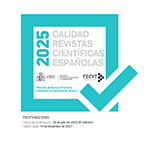Radio in school as a resource for the development of media competence
Abstract
In recent decades, different national and international organizations have reflected, through documents and recommendations, the importance of media-related training in the comprehensive development of students, referring to it with various conceptualizations. However, despite the importance of media competence in education, and having been supported by theory, its learning by students should continue to progress hand in hand with media such as school broadcasting radios that have shown their great possibilities in the acquisition of knowledge and development of skills of the students. Therefore, the objective of this research is to assess the effects of school radio on the development of media competence in students, through 18 indicators related to the four key competences included in the current educational legal framework: linguistic competence, digital competence, social and civic competence and competence of the sense of initiative and entrepreneurial spirit. Because of this, a qualitative research has been developed based on the answers to an open response questionnaire by teachers responsible for school radio projects in primary and secondary schools. The results of this research show the positive effects that working with radio stations in these educational centers has on the different competences, since the effects are positive in all indicators, except in the use of the school library and ICT, in which effect produced is neutral. These results confirm the importance of school radio to develop the four competencies related to media competence, which must serve for the advancement of school radio in the future and increase its presence in student learning.
Downloads
Article download
License
In order to support the global exchange of knowledge, the journal Estudios sobre el Mensaje Periodístico is allowing unrestricted access to its content as from its publication in this electronic edition, and as such it is an open-access journal. The originals published in this journal are the property of the Complutense University of Madrid and any reproduction thereof in full or in part must cite the source. All content is distributed under a Creative Commons Attribution 4.0 use and distribution licence (CC BY 4.0). This circumstance must be expressly stated in these terms where necessary. You can view the summary and the complete legal text of the licence.










